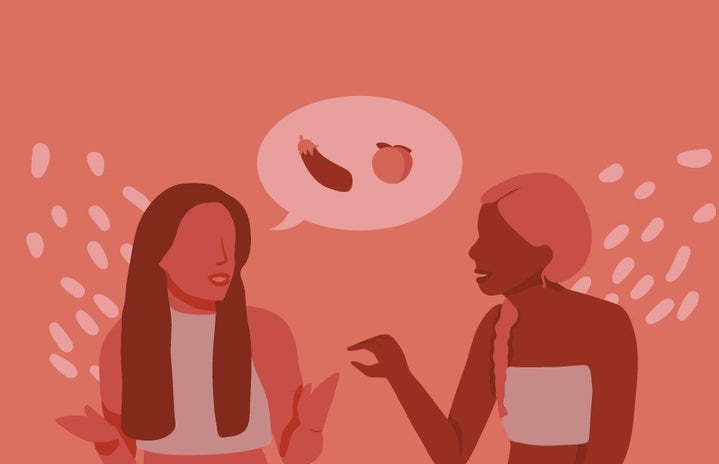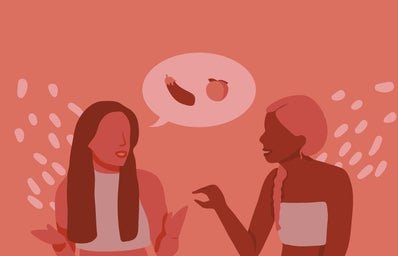Porn literacy and sex positive conversations are lacking in our society. Here is an organization looking to change that: The Porn Conversation, a non-profit created by Erika Lust and Pablo Dobner.
I had the opportunity to speak with Avril Clarke, clinical sexologist and a brand manager of The Porn Conversation, about the company: here’s what I learned.
Noam Wasik: What brought you into this nonprofit?
Avril Clarke: Being a clinical sexologist, I was kind of doing different things within the education fields like Preventing Sex Education Events for mainly adults, and then there’s this great company here based in Barcelona that creates ethical pornography, and their [founders] name is Erica Lust and I got linked up with them. They told me about their nonprofit project [The Porn Conversation].
So basically, I found out about their nonprofit project, and they were looking to relaunch it and I thought it was a really interesting topic, because I felt like, no matter where I was working in the sex education industry, still, no one was really talking about porn, but it was so prevalent. And so, it was an exciting project to take on for sure.
NW: What combination of ideas led to the creation of this nonprofit?
AC: Obviously, a lot of the free à la carte porn that most consume comes with a lot of messages, right, that can be really harmful to oneself and their relationship with themselves or their relationships with others.
So this can range from body image issues or the fetishization of Black [or] indigenous people of color and there’s the sexualization of teens. They basically had this idea of creating a new tech porn, porn that was not taken from the male gaze, but has a more gender inclusive approach that is made and produced ethnically.
Coming from that, but also being a mom or parents, [Lust] has two teen daughters, they realized that there was this huge responsibility to also not only create porn that’s different, but to talk about porn in general.
NW: What do you think of the stigma surrounding conversations about sex?
AC: I feel like there’s stigma surrounding the conversations of sex, for sure but then there’s also the stigma surrounding the conversation of porn. They stigmas surrounding conversations of porn and sex relate some ways, and then they kind of don’t. There is a lot of shame in society, and this is globally. This is something that people are not really comfortable with talking about.
They don’t think that maybe it begins at home where maybe they weren’t taught or told anything about sex, about changing bodies, or about things that really should be discussed.
On the other hand, we’re receiving loads of messages through the media all the time about what it means to be sexy, what it means to be deserving of pleasure, what it means to be attractive. There’s this huge disconnect, because there’s this lack of education and this lack of media literacy, along with these really strong, intense messages that may not align with who we are, how we feel, or our values.
It really comes down to the discomfort people have with these conversations. This is why The Porn Conversation is so important. This is why talking about things like masturbation is so important, because these are things that happen behind closed doors, we’re just not supposed to talk about it.
Obviously, sex is the source of life for many and so it just makes sense that we would talk about it. Hopefully, through projects like this and others, we can break that stigma.
NW: Can you define sex positivity and porn literacy?
AC: I’ll start with porn literacy; I think it’s very much the heart of our project. Porn literacy is based off a decades-old educational framework called media literacy, which they’ve been using in language arts and English classes forever when you break down: who is the author, who created this, what are they trying to say, how do you feel like it affected you and how do you think others would feel about this? But we’re doing it with porn.
We’re doing it in a way where we’re recognizing that porn is a form of mainstream media, just as a Netflix series, or a TV commercial or a billboard advertisement. It’s something that’s there, and it’s sending us messages.
Porn literacy allows us to critique and question and deconstruct the messages that we’re receiving from it, and to create our own meanings from itto ultimately decide is this a form of media I want to keep in my life? Or how can I use it differently? Or maybe I can choose different forms of this media? I can explore ethical pornography or whatever or none at all.
Ultimately, recognizing how much media defines our behaviors sometimes because there’s all these unrealistic expectations about sex, about how we’re supposed to behave and act and what we’re supposed to expect in the partner. It’s not relatable.
It really helps kind of divide the fact from fantasy.
Sex positivity is a great word we hear a lot lately. Some people might define it differently, I think it’s more just the idea that sex is an inherent part of life, and it should be celebrated. It should not be spoken about with shame or fear.
You can be a sex positive individual by being a mom who talks to your kids about porn or sex, or you’d be a sex positive individual by not showing shame towards people of different sexual orientations than yourself, you know. It’s just the celebration and the acceptance of sex as a natural part of life.
NW: How do you view the role of porn in our society?
AC: It has a huge effect on our sex lives in general. I’m not porn negative, it can also bring a lot of clarity, and a great sense of exploration for some people it can be a really safe outlet for some to explore these things.
Unless we don’t have the ability to really understand that porn is something that is created, there are some harmful influences it can possibly have.
It can lead to the fetishization of certain races, it can lead to maybe violence or misogyny. At the end of the day, just like who we follow on Instagram or TikTok, it can really shift the way that we speak and dress and the music we listen to.
Porn could do the same thing, but in our sex lives, especially if there’s no sex education, and then we’re going to porn to learn about sex. We don’t really have the knowledge to understand that it’s fake, it’s created. These are actors that get paid, and they have water breaks and bathroom breaks. Some of them use medication to have an erection for an hour.
It’s something that deserves some education behind and it’s something that can actually bring a lot of really nice pleasure to, it just depends on your values.
NW: What do you think is lacking from sex education curriculum in general?
AC: When sex education is typically available for people or young people, it can be very like cis heteronormative, it’s really focused on penetration or pregnancy.
Even the language they use can be really shameful. Starting from the way we talk about our bodies, the way we understand sex and gender, we’re missing a lot of like the context about the different ways to have sex.
When we talk about the consequences of sex, they don’t really talk about the positive consequences too, it can bring pleasure and connection. It can be something that’s really nice, and we don’t teach students how to how to understand that STIs are super common. They happen quite often, and it’s no big deal, and there are preventative measures you can take. We don’t teach that that access to abortions and sexual health care should be a right.
We lack the language and the tools to really navigate the intersectional society that we have today.
NW: How do you get your message out to the community? What is your target audience?
AC: Our audience is quite a big range. The reason why we’re doing such a big ranged audience is because it’s a multi-generational issue we are facing here.
We have educators, we have teachers at schools, educators at community centers, or a sexologist who holds sex ed workshops.
Then we have the families. These are obviously families of young people we’re hoping to reach from the ages of like eight to 18. It’s impactful when they’re living at home because we want them to have conversations at home. We created conversation guides for families, so they can have scripted information on how to talk about porn for kids and their teens.
We have a curriculum we made for educators too, and we have also an ambassador program.
We’re working on finding people within our communities that feel like they align with our values and want to bring our project to their communities. If that’s through workshops, or them sharing their own insight, it’s really impactful if we have more voices involved.
As far as universities go, I didn’t want to stop there. I felt like this is such an issue that continues, and I feel like no one’s really talking about it. It was really important for me to create something for university students as well, so we have like the student ambassador program, which is about a year- long program for university students, especially those who are activists and want to make a change within gender studies or in sexual health and wellness.
I’m hoping to connect these younger, university age activists together and we can create things together, and share our insights and our stories.
It would be really nice to kind of create a full circle, because I do think that, depending on your age, your gender, or your location, this conversation can take so many different groups so I want to hear what everyone else has to bring to the table.
Sex and porn should not be a shameful topic. Sex can lead to pleasure and connection and have positive consequences. The Porn Conversation wants to help eliminate the shame of sex and help introduce porn literacy into a society saturated in porn, and can be found at thepornconversation.org and @thePconversation on Instagram.
This interview was condensed and edited for clarity.

